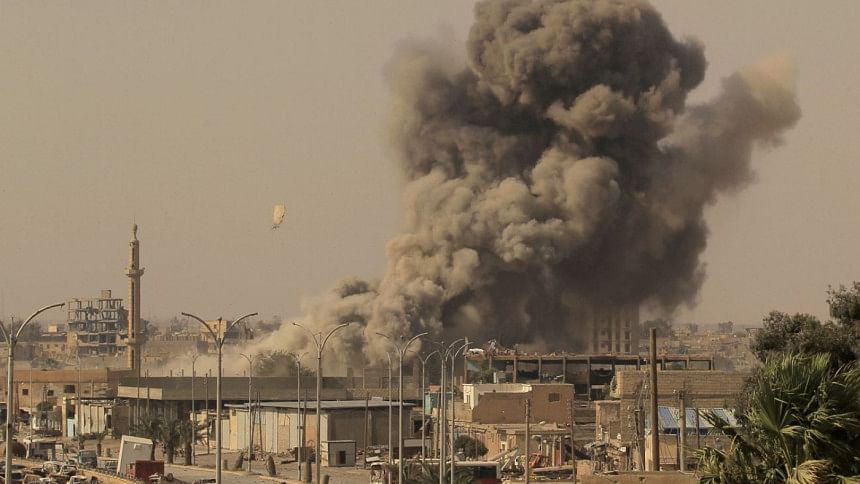Navigating the Syrian endgame

After a suspiciously sudden conversion, Russian President Vladimir Putin now claims to be worried about the fate of millions of refugees who have fled the carnage in Syria. In a recent meeting with German Chancellor Angela Merkel, Putin expressed his hope that the European Union would help to rebuild Syria so that its displaced people could start to return home. And in recent weeks, Russian diplomats have been hawking the same message across European capitals.
To be sure, now that Bashar al-Assad's regime has reclaimed most of the country's territory, Syria's civil war is clearly winding down. But that outcome was not inevitable. On the contrary, the Syrian army was very close to collapsing at one point. Only with the crucial help of Iranian-backed militias and Russian air support did Assad manage to turn things around.
Meanwhile, US efforts to establish a "moderate" armed opposition achieved little, apart from giving the Kurdish People's Protection Units (YPG)—an offshoot of the Kurdistan Workers' Party (PKK)—control of the strip of northern Syria abutting the Turkish border. The only thing left to do now is to destroy Al Nusra's remaining enclave in Idlib and broker some kind of settlement between the YPG and Assad.
Assad has survived at a horrible cost. More than half of the Syrian population has been displaced internally or forced to flee to nearby countries or to Europe. Much of Syria's infrastructure—from housing blocks to hospitals—lies in ruins. And, needless to say, the country's economy has been shattered, owing to the direct effects of the conflict and to sanctions that were imposed as part of the failed effort to force Assad into a political settlement.
No other country in the past half-century has suffered so heavy a toll in human lives and physical destruction. There can be no doubt that the responsibility for this tragedy rests with the Assad regime and its Russian and Iranian sponsors. Of course, they will say they were fighting terrorism, as if that excuses their indiscriminate methods and reckless disregard for civilian lives. But future generations will remember the true source of the terror that was visited upon the Levant over the past seven years.
The estimated cost of rebuilding Syria varies widely. While a 2017 World Bank study puts the price at around USD 225 billion, more recent assessments suggest a total closer to USD 400 billion; others expect the sum to approach USD 1 trillion. And that does not even count the human costs of the war.
It is clear from Putin's European charm offensive that Russia has no intention of footing even a small part of the bill. Apparently, the Kremlin does not feel as though it has a duty to rebuild the cities and restore the livelihoods that its bombs destroyed.
Nor is the United States particularly eager to help. Just last week, the Trump administration cancelled USD 230 million in funding for the reconstruction of Raqqa and other areas liberated from ISIS. It is now hoping that Saudi Arabia will foot the bill instead. If there is any wisdom in that move, it remains to be seen.
With the US stepping back, it is obvious why Putin suddenly wants to talk to the Europeans about the plight of Syrian refugees. He didn't care about them when his bombs were falling on their neighbourhoods and forcing them to flee. But now that he wants Europe to bail out Assad, he has found some compassion.
But it is not clear that Assad even wants displaced Syrians to return. If anything, he seems ready to exploit the situation to reengineer the country's ethnic and political composition, making it safer for his own minority sect, the Alawites. Hence, a new law grants refugees just one year to reclaim their property before the government seizes it; and other bureaucratic requirements seem designed to allow Syrian authorities to refuse re-entry to anyone they don't like.
Moreover, Assad has stated explicitly that European companies are not welcome to help with the reconstruction, and that preference should be given to Russian firms. Clearly, the regime is preparing to profit from any rebuilding assistance that comes its way. For all of these reasons, the last thing that Europeans should do is send money directly to Assad. A far better option is to offer direct financial support to individuals and families that are willing and able to return to their country.
At the same time, the EU should not lift sanctions until a credible political settlement between the regime and opposition forces has been reached. The question is whether such a settlement is even possible. So far, every realistic proposal has been torpedoed by Assad's insistence that he remain in power.
Assad would do well to remember that he now rules over the wreckage of a country. Even when the guns fall silent, his regime will not be secure. His inability to revive Syria will leave him vulnerable in the same way that his refusal to countenance political reforms did eight years ago. Europe has no interest in saving Assad from that dilemma. Help for Syria must await a genuine political solution. After the destruction that the Assad regime has wrought, there is no other way forward.
Carl Bildt is a former prime minister and foreign minister of Sweden.
Copyright: Project Syndicate, 2018. www.project-syndicate.org





Comments